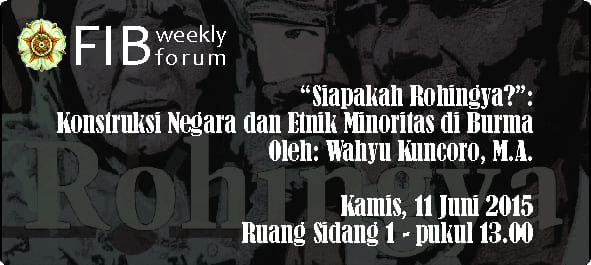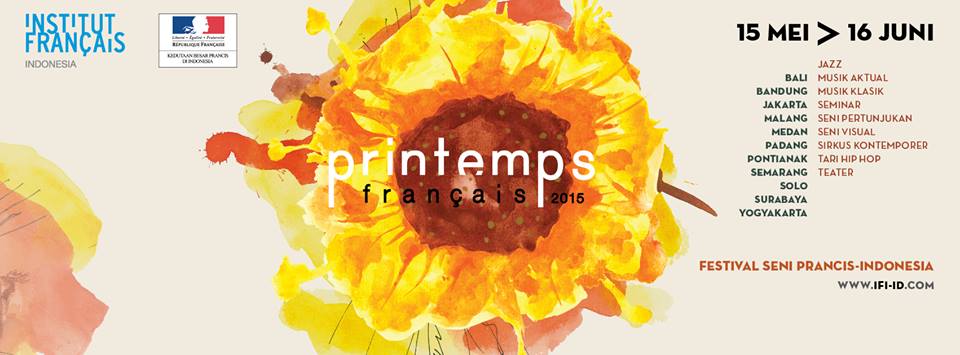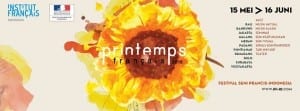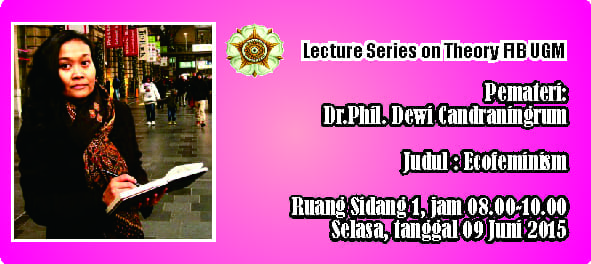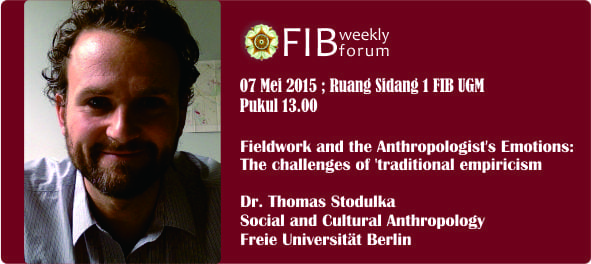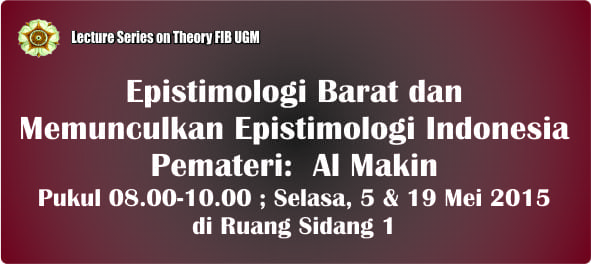FIB Weekly Forum
Kamis, 11 Juni 2015
Ruang Sidang 1 – pukul 13.00
Oleh: Wahyu Kuncoro, M.A.
Dalam beberapa bulan terakhir, isu seputar diskriminasi yang menimpa etnis Rohingya di
Burma (Myanmar) telah menyita perhatian dari berbagai kalangan di Indonesia. Salah satu
wacana yang terus berkembang adalah status Rohingya sebagai “stateless person” (orang
tanpa kewarganegaraan) yang menyebabkan mereka kehilangan hak-hak sebagai warga
negara khususnya berkaitan dengan tempat tinggal dan jaminan keamanan. Konflik
keagamaan juga sering bergulir dibalik isu mengenai etnis Rohingya yang tentu saja sangat
beresiko menyulut munculnya sentimen keagamaan di negara-negara lain, termasuk di
Indonesia. Untuk menghindari tumbuhnya sentimen tersebut maka penting bagi artikel ini
untuk mendiskusikan mengenai konstruksi identitas nasional dan etnik minoritas di
Burma, terutama yang menyangkut etnis Rohingya, dalam prespektif ilmu antropologi.
Dengan tidak mengesampingkan isu Rohingya dengan “manusia perahu” yang tengah
berkembang, artikel ini lebih memberikan fokus pada perkembangan formasi penyusun
etnisitas Rohingya dari awal masa kejayaannya di abad 16 hingga di era democratization
Burma saat ini. Terlepas dari status mereka yang stateless, istilah Rohingya sendiri bisa
dikatakan masih begitu kontradiksi bagi orang-orangnya. Sebagian besar Rohingya merasa
tidak nyaman dengan istilah “Rohingya” – lebih memilih dikenal sebagai Muslim Arakan –
yang diformulasikan oleh negara untuk mengeksklusi hak kewarganegaraan mereka.
Jumlah etnis Rohingya diperkirakan mencapai 3,5 juta orang, 2 juta di antaranya tinggal di
wilayah otonomi Rakhine (termasuk di berbagai kamp pengungsian yang menyebar di
wilayah perbatasan Burma dengan Bangladesh) dan sisanya tersebar di berbagai penjuru
dunia seperti Thailand, Pakistan, China Selatan, Malaysia, Amerika dan Jepang.
Artikel ini disusun berdasarkan tiga obyektif berbeda yaitu, 1. Menarik benang merah
mengenai siapakah etnis Rohingya itu; 2. Meninjau kembali akar konflik yang menimpa
etnis Rohingya; dan 3. Menarasikan perjuangan hidup etnis Rohingya yang tinggal di
perbatasan Thailand-Myanmar. Berangkat dari ketiga obyektif tersebut, artikel ini ingin
menunjukkan bagaimana perjuangan hidup Rohingya yang memilih untuk tidak melakukan
pelarian melalui rute laut melainkan bagi mereka yang bertahan tinggal di Burma atau
berpindah ke negara-negara tetangga melalui jalur darat. Aspek kesejarahan dalam artikel
ini diperoleh dari hasil documentary research dua buku utama yaitu “The Burmanization of
Myanmar’s Muslims” karangan J.A. Berlie dan “The Muslims of Burma” yang ditulis oleh
Moshe Yegar. Di samping itu, data yang dipresentasikan dalam artikel ini juga diperoleh
dari hasil partisipasi observasi bersama komunitas Muslim dari Burma di kota Mae Sot,
salah perbatasan internasional Thailand dengan Myanmar.

